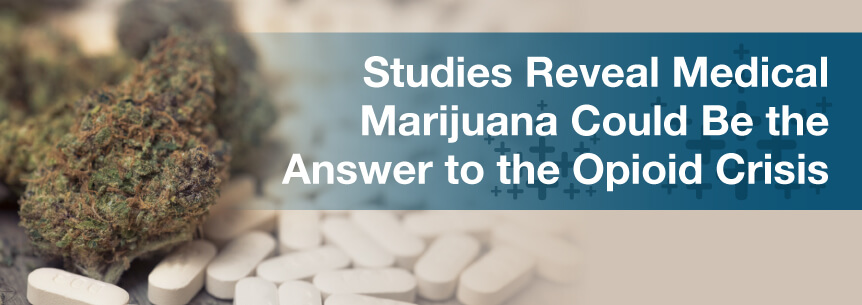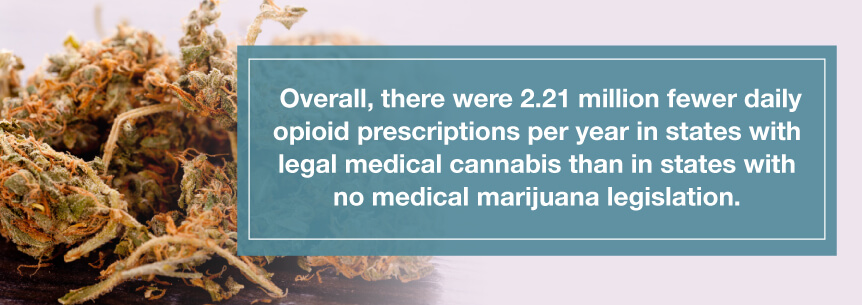
On Monday, April 2, 2018, two new studies were released that contained evidence of medical marijuana having the ability to stop the opioid crisis currently affecting thousands of people throughout America. Specifically, the studies found that the number of opioid prescriptions has decreased in U.S. states that have adopted medical cannabis programs or completely legalized the recreational use of marijuana.
The idea of medical marijuana being able to reduce the severity of the opioid epidemic across America is nothing new. In fact, recovering addicts have been using cannabis to self-medicate for decades. Many addicts claim the plant has been effective in reducing their urge to use harder substances, like heroin and other opioid painkillers.
However, this research presents concrete evidence that medical marijuana legislation has the power to reduce and perhaps eventually end this epidemic.
Jason M. Hockenberry of Emory University and Hefei Wen of the University of Kentucky found reductions in the rate of Medicaid prescriptions for opiates in states that passed either medical or recreational cannabis laws between 2011 and 2016.
States that passed medical legislation saw a decrease of 5.88 percent, on average, while states that legalized recreational use saw an average drop of 6.38 percent. They concluded that legal marijuana could be a significant factor in tackling the country’s opioid crisis.
This study is one of the first to find a connection between opioid use and recreational marijuana, which will undoubtedly be monumental for states deciding between making a move to entirely legal, adult-use cannabis.
The second study, conducted by W. David Bradford, Amanda Abraham and Ashley C. Bradford at the University of Georgia, discovered similar results in opioid prescriptions from Medicare Part D between 2010 and 2015. Overall, there were 2.21 million fewer daily opioid prescriptions per year in states with legal medical cannabis than in states with no medical marijuana legislation.

States with medical marijuana programs had an average 8.5 percent reduction in daily doses filled, and states with medical cannabis dispensaries saw an even more dramatic decrease of 14.4 percent. Likewise, U.S. states with legal home cannabis cultivation legislation saw a 6.9 percent decrease in opioid prescriptions.
Fentanyl prescriptions, which is a synthetic opioid similar to heroin that physicians can legally prescribe, also decreased by 8.5 percent in states with legal medical marijuana. Even a small amount of Fentanyl can be fatal — the substance is between 50 and 100 times stronger than morphine.
While these studies cannot prove cause-and-effect, they do prove correlation. Ultimately, though, the findings suggest Medicare and Medicaid enrollees in medical and recreational states reduced or eliminated their opioid use, on average, by the noted amounts.
There are several benefits of marijuana over opioid painkillers, including that cannabis is:
Many states and Washington, D.C., have now legalized at least some form of medical marijuana, and multiple studies have proven they are all seeing a decline in opioid prescriptions.
These studies follow the trend of many before them, including a 2014 research effort that found states with medical cannabis legislation had a nearly 25 percent drop in overdose deaths between the years 1999 and 2010. A 2017 study also found Colorado’s legal recreational use laws from 2012 caused the state’s previously upward trend in opioid deaths to reverse. It would be difficult to argue against this research, which proves medical marijuana and reduced opioid prescriptions have a connection.
While the two most recent studies only included information on Medicare and Medicaid prescriptions, the researchers noted that these groups include many — if not most — of the patients who would be applicable for each state’s medical marijuana program. At the very least, they are the population that would be most likely to attempt using cannabis for medicinal purposes.
For more information on medical marijuana and reduced opioid prescriptions, MarijuanaDoctors.com has the resources you need, including extensive posts on marijuana vs. opiates and how cannabis can decrease opioid overdoses and deaths.
No Information on MarijuanaDoctors.Com should be used to diagnose, treat, prevent or cure any disease or condition. You can view our Full Disclaimer here.